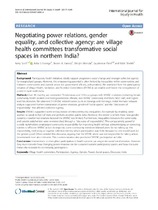| dc.contributor.author | Scott, Kerry | |
| dc.contributor.author | George, Asha S. | |
| dc.contributor.author | Harvey, Steven A. | |
| dc.contributor.author | Mondal, Shinjini | |
| dc.contributor.author | Patel, Gupteswar | |
| dc.contributor.author | Sheikh, Kabir | |
| dc.date.accessioned | 2018-10-29T12:35:21Z | |
| dc.date.available | 2018-10-29T12:35:21Z | |
| dc.date.issued | 2017 | |
| dc.identifier.citation | Scott, K. et al. (2017). Negotiating power relations, gender equality, and collective agency: are village health committees transformative social spaces in northern India? International Journal for Equity in Health, 16: 84 | en_US |
| dc.identifier.issn | 1475-9276 | |
| dc.identifier.uri | http://dx.doi.org/10.1186/s12939-017-0580-4 | |
| dc.identifier.uri | http://hdl.handle.net/10566/4166 | |
| dc.description.abstract | BACKGROUND: Participatory health initiatives ideally support progressive social change and stronger collective agency
for marginalized groups. However, this empowering potential is often limited by inequalities within communities and
between communities and outside actors (i.e. government officials, policymakers). We examined how the participatory
initiative of Village Health, Sanitation, and Nutrition Committees (VHSNCs) can enable and hinder the renegotiation of
power in rural north India.
METHODS: Over 18 months, we conducted 74 interviews and 18 focus groups with VHSNC members (including female
community health workers and local government officials), non-VHSNC community members, NGO staff, and higherlevel
functionaries. We observed 54 VHSNC-related events (such as trainings and meetings). Initial thematic network
analysis supported further examination of power relations, gendered “social spaces,” and the “discourses of
responsibility” that affected collective agency.
RESULTS: VHSNCs supported some re-negotiation of intra-community inequalities, for example by enabling some
women to speak in front of men and perform assertive public roles. However, the extent to which these new gender
dynamics transformed relations beyond the VHSNC was limited. Furthermore, inequalities between the community
and outside stakeholders were re-entrenched through a “discourse of responsibility”: The comparatively powerful
outside stakeholders emphasized community responsibility for improving health without acknowledging or correcting
barriers to effective VHSNC action. In response, some community members blamed peers for not taking up this
responsibility, reinforcing a negative collective identity where participation was futile because no one would work for
the greater good. Others resisted this discourse, arguing that the VHSNC alone was not responsible for taking action:
Government must also intervene. This counter-narrative also positioned VHSNC participation as futile.
CONCLUSIONS: Interventions to strengthen participation in health systems can engender social transformation. However
they must consider how changing power relations can be sustained outside participatory spaces, and how discourse
frames the rationale for community participation. | en_US |
| dc.language.iso | en | en_US |
| dc.publisher | BMC | en_US |
| dc.rights | © The Author(s). 2017 Open Access This article is distributed under the terms of the Creative Commons Attribution 4.0
International License (http://creativecommons.org/licenses/by/4.0/), which permits unrestricted use, distribution, and
reproduction in any medium, provided you give appropriate credit to the original author(s) and the source, provide a link to
the Creative Commons license, and indicate if changes were made. The Creative Commons Public Domain Dedication waiver
(http://creativecommons.org/publicdomain/zero/1.0/) applies to the data made available in this article, unless otherwise stated. | |
| dc.subject | Village health committee | en_US |
| dc.subject | Participation | en_US |
| dc.subject | Agency | en_US |
| dc.subject | Gender | en_US |
| dc.subject | Power | en_US |
| dc.subject | Social spaces | en_US |
| dc.subject | Discourse | en_US |
| dc.subject | India | en_US |
| dc.title | Negotiating power relations, gender equality, and collective agency: are village health committees transformative social spaces in northern India? | en_US |
| dc.type | Article | en_US |
| dc.privacy.showsubmitter | FALSE | |
| dc.status.ispeerreviewed | TRUE | |
| dc.description.accreditation | ISI | |

